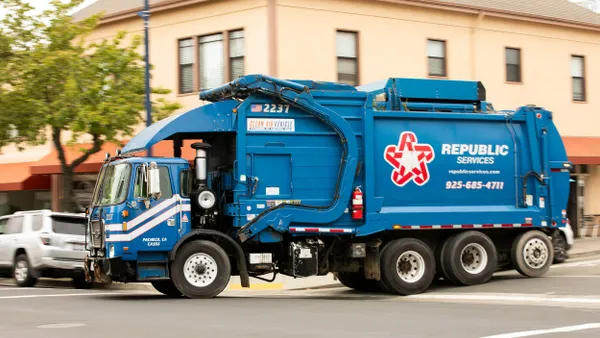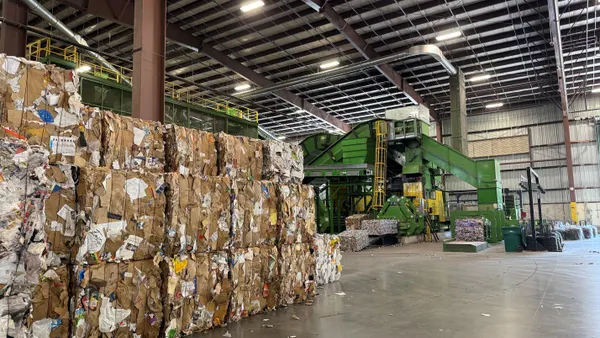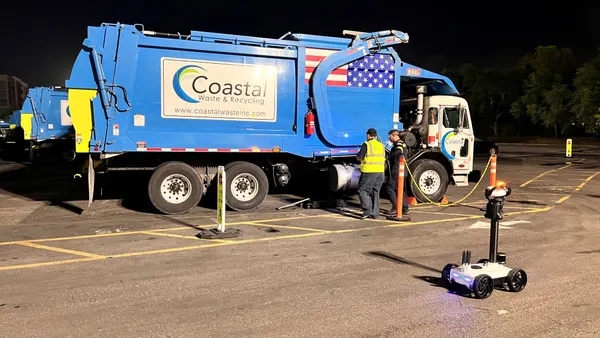Dive Brief:
- Legislation introduced yesterday (Intro. 1574) calls for New York's commercial waste industry to be converted into an exclusive franchise system with 20 zones, in which no company would be able to win more than 15 zones. Contracts would run for 10 years with two potential 5-year extensions, and brokers would effectively be shut out unless they apply for hauling licenses.
- The bill outlines extended bid criteria and service requirements originally laid out by the Department of Sanitation's (DSNY) prior plans. Haulers would have to develop waste reduction plans and offer organics collection to all customers, priority would be given for "sustainable" infrastructure investments, and up to 40 hours of mandatory worker training would be required, among many other items.
- As written, the legislation would allow "micro-haulers" (any business collecting less than 60 tons of organics per year with low-emission vehicles) to continue operating. Subcontracting would also be allowed, to potentially keep smaller companies viable. Outside companies would be permitted to bid, provided they apply for a city license.
Dive Insight:
The long-awaited bill now has nine sponsors — including the council speaker — from three of New York's five boroughs. Aside from language on exclusive zones versus non-exclusive zones, the framework largely mirrors what was expected from DSNY. Still, the difference is significant and could be one of multiple factors that keep the bill from moving any time soon — if at all.
Mayor Bill de Blasio's administration appears to currently be at odds with Council Member Antonio Reynoso — the bill's primary sponsor and sanitation committee chairman — over how to proceed. While there had been initial talk of a June committee hearing and calls for "swift passage" in a press release, Reynoso recently told Politico he expected the entire legislative process to potentially take months.
Reynoso launched the bill at a rally with the Transform Don't Trash Coalition, including the Teamsters and multiple other environmental groups, on the steps of city hall. The event sought to paint the current industry as one beyond repair. The now defunct hauler Sanitation Salvage and its role in covering up the death of an off-the-books worker was invoked repeatedly.
"I am proud to introduce legislation to reign in New York City's private carting industry once and for all," Reynoso said in a statement. "A commercial waste zone system is a catch-all solution that will finally transform this industry for the sake of workers, communities, and the environment."
Industry trade groups, such as the NWRA and New Yorkers for Responsible Waste Management (NYRWM), still favor making changes to the current open market system and have supported prior legislative efforts to do so.
"With the sole exception of limiting waste collection services to just one city-selected company in each of twenty zones, all of the elements of the proposed legislation are worth full consideration and can be effectively addressed in the city's existing regulatory system," said NYRWM Executive Director Kendall Christiansen in a statement, referring to the exclusive proposal as a "Monopoly/Cartel" system.
New York is one of the last big cities where national agglomerates don't dominate the collection business, although it's believed that either zone option could hasten what has already been a large amount of recent market consolidation. The exclusive concept is backed (with different degrees of enthusiasm) by the city's two largest haulers: Action Environmental and Waste Connections. An exclusive system is also considered potentially more appealing to outside bidders — Waste Management, for instance — but is far more likely to face concerted resistance from DSNY.
Ultimately, some level of cooperation will have to be struck between the council and the administration if this plan has a chance of coming to fruition. In a sign of possible comity, Reynoso simultaneously introduced two bills (Intros. 1573 and 1575) to expand powers of the Business Integrity Commission (which regulates the commercial waste industry). The de Blasio administration has spent months pushing for this, and BIC's former commissioner cited it as a priority in an exit interview with Waste Dive. Reynoso and labor allies, however, had been skeptical in the past.
Now that legislation is finally out, the multi-year debate over New York's commercial waste industry is poised to kick into its highest gear yet. The process has been quite lively up to this point, so plenty of lobbying for votes, jockeying for support from the business community, invoking the successes or failures of franchising in other cities, and other rhetorical sparring can be expected in the weeks —or months — ahead.
A previous version of this article stated current industry workers were protesting the pro-franchise zone rally. Given that Waste Dive was not present at the rally to confirm this, that mention has been cut.











